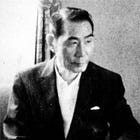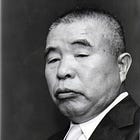I’d like to start off by saying that before I was told about Takayoshi Otani recently, I had never heard of him. There are also no photos of him anywhere on the internet, which got me interested in why. I looked through the few links in Japanese that I could find about Takayoshi Otani and came up with the following Substack article. There should be a movie made about all these guys! If I have made any mistakes, I’m sure there will be comments but this pretty accurate as far as I can tell from the limited resources around.
The Jewelry King of Japan
Takayoshi Otani, often referred to as the "Jewelry King of Japan," is a figure whose name is synonymous with luxury and elegance in the jewelry industry. However, beneath this glittering facade lies a more complex and shadowy narrative, intertwining his successes in the luxury market with an extensive web of political and underground influence. His life story reveals a man who navigated the corridors of power with remarkable skill, becoming a significant player in both legitimate and illicit circles.
If you like this Substack post of him, you may also like this one!
Otani's prominence in the jewelry trade earned him various monikers from the media, including "the last fixer," "the king of darkness," "the monstrous rich man of Yoyogi," and "the most interesting person behind the scenes of Japanese politics and business." These titles reflect not only his wealth but also his profound connections within the realms of politics and business, where he was known to operate as a hidden power.
His relationships with prominent figures were notably cultivated through his cousin-in-law, Shojiro Keijiro, a bureaucrat in the former Ministry of Finance and former Director General of the Economic Planning Agency. This connection enabled Otani to establish ties with finance bureaucrats and politicians, including the influential former Prime Minister Takeo Fukuda. Through these personal connections, Otani solidified his status as a jewelry dealer and even assumed the presidency of the Japan Jewelry Club.
Otani’s private life was marked by opulence and isolation. I could not find any photos online of him.
Otani resided in a sprawling 1,000-tsubo mansion in Yoyogi Uehara, rarely seen in public and surrounded by a dozen or so servants. This lifestyle only added to his air of mystery, earning him a reputation as a man of few words and many secrets. His significant influence was well recognized; companies sought his advisory roles to navigate crises and avoid conflicts with gangsters and politicians alike.
The marriage of his eldest daughter, Kyoko—who was crowned Miss Universe Japan in 1957—to Mitsuhiko Otani, the third son of the 14th Iemoto of the Urasenke School, further entwined his family with Japan's elite. This marriage was on the recommendation of writer Eiji Yoshikawa and the connection brought Otani closer to influential figures, including Tadao Watanabe, former chairman of the former Sanwa Bank (it merged with Tokai Bank to form UFJ Bank which is now part of MUFG Bank), and Konosuke Matsushita, a close friend of the Urasenke family. He was also distantly related to the Prince Mikasa family through the marriage of Sen Soshitsu, the 16th Iemoto of the Urasenke family, to Princess Yoko.
Connections to the Underworld
Otani's network extended into the underground world, where he was acquainted with some of Japan's most notorious figures, including Yoshio Kodama, the greatest postwar fixer, and Kazuo Taoka, the third boss of the Yamaguchi-gumi and the Godfather of Godfathers in Japan. His ties to these powerful individuals illustrated the breadth of his influence and the respect he commanded in both legitimate and illicit arenas.
If you like stories of colourful characters, you’ll love this one too! Kodama was one of the most famous behind-the-scenes power brokers of the 20th century in Japan.
Takayoshi Otani's legacy is a reflection of a man who successfully balanced the worlds of luxury and power, creating an intricate tapestry of influence that spanned political, business, and underground realms. His numerous titles—from "Supreme Advisor to Urasenke" to "Chief Corporate Friend of Mainichi Newspapers"—demonstrated the trust placed in him by those seeking to navigate the complexities of Japan's socio-political landscape.
Upon Otani's death, Takeo Fukuda, who had been a close ally, served as the chairman of his funeral committee, underscoring the deep connections Otani forged throughout his life. His life serves as a reminder of the often-hidden forces that shape society, leaving an indelible mark on Japan’s history that will not soon be forgotten.
Thank you to Akiro who first told me about the Otani story.
Rionne McAvoy is the director of the award-winning documentary The One's Left Behind: The Plight of Single Mothers in Japan, showcasing his dedication to addressing pressing social issues. A committed documentary filmmaker and professional wrestler, he explores critical themes with passion and insight. Additionally, he has a keen interest in post-World War II Japan, particularly the intricate connections between politicians and gangsters during that era. Known in the wrestling ring as Rionne Fujiwara, he brings the same determination and storytelling prowess from his wrestling persona to his filmmaking endeavors.










